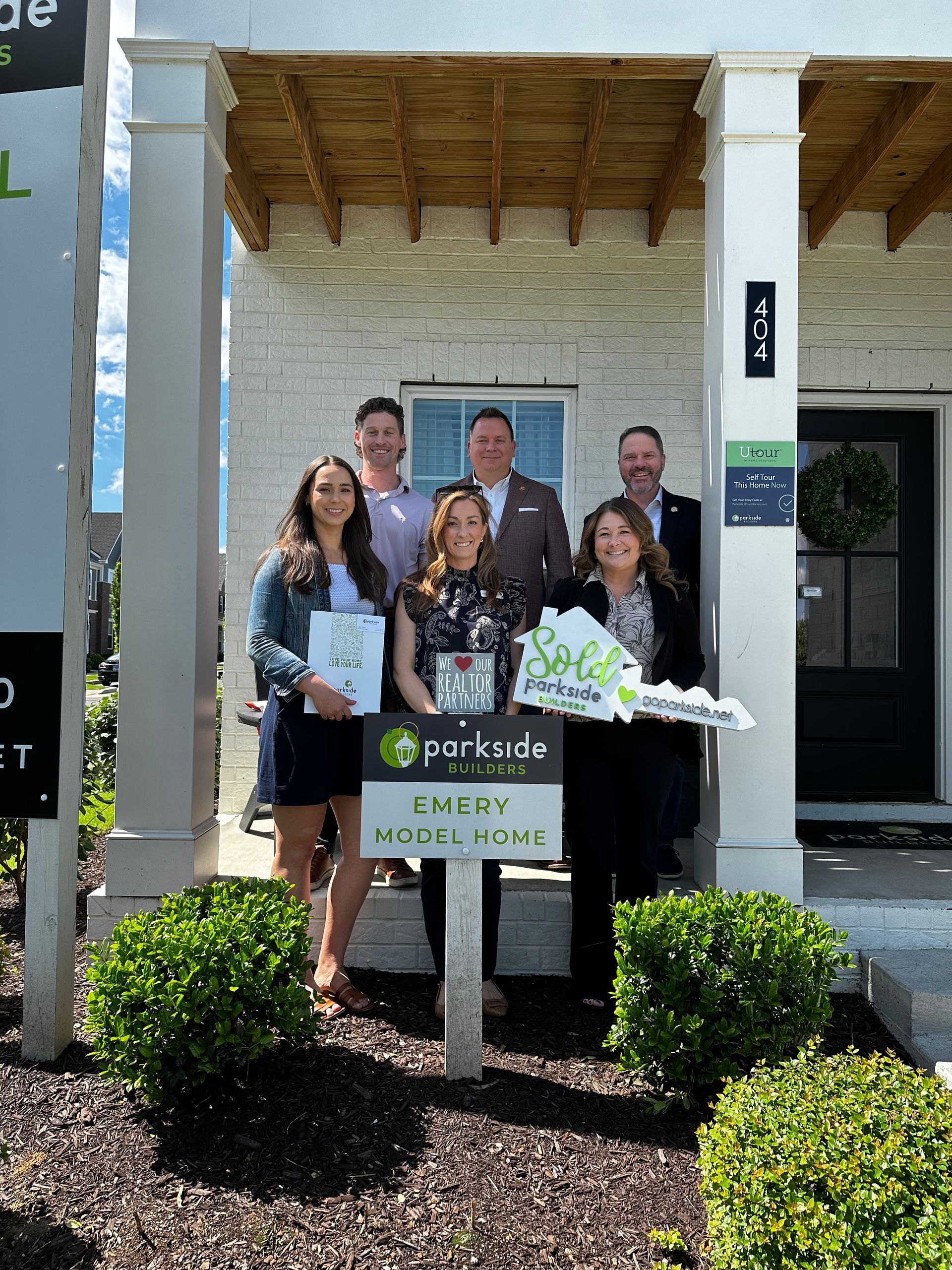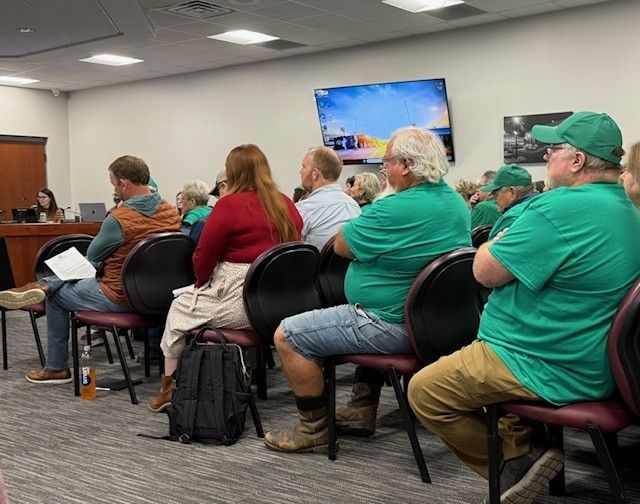Happening Now
Stay up-to-date with our recent news and happenings here!
Happening Now

How long have you been working in the real estate industry? I got my license in 2006 while still working as an accounting consultant, but I officially began working in the industry in 2007. How did you get into real estate? I was investing in real estate and encountered an issue at closing, a last-minute cost I wasn’t expecting. My agent wasn’t present, and it turned out that a seller-paid closing cost had been unchecked on a counteroffer, something my agent, lender, and I all missed. That experience pushed me to take real estate classes. I figured it would make me a smarter investor. As a CPA, the coursework was manageable, and eventually a builder asked me to work his subdivision. The rest is history! What inspired you to join Sumner REALTORS®? It was all about location. I knew I wanted to work in my own community, and Sumner REALTORS® was the natural fit. What goals or metrics would you like to help Sumner REALTORS® achieve in 2025? In 2025, I want us to defy the odds and grow our membership! I’d love to see RPAC investments reach $65,000, our Commercial Real Estate and Property Management groups flourish, and for us to continue building strong local political relationships to make Sumner County an even better place to live, work, and play. What is one key lesson or insight you’ve learned over the years in this industry? A veteran agent once told me: “Don’t chase the commission.” Focus instead on helping people find their perfect home or sell at the best price, the rest will follow. My father often quoted Matthew 6:33 to me: “Seek first the kingdom of God… and all these things will be added to you.” That wisdom has guided me many times throughout my career. What’s one thing you’re particularly excited about in 2025? We’re in a time of transition in the industry, and that brings opportunity. The public is paying more attention to what REALTORS® really do. This is our moment to show our value, and for those investing in the Association, it’s a chance to build stronger communities, support during disasters, and advocate for homeownership and property rights. How do you see Sumner REALTORS® making a difference in the community or industry? Sumner REALTORS® supports my business through education and networking, but it also gives me a meaningful way to give back. From charity events like the Golf Tournament and Haunted Hustle, to school supply drives, blood donations, and veterans initiatives, we’re making an impact. The Association also gives us a voice with local, state, and federal leaders. That advocacy is vital if we want to shape better communities. What advice or words of encouragement would you give to someone aspiring to join the Board or take on a leadership role? Just do it! Start by joining a committee, find an area you're passionate about or curious to learn more. Serving on the Board is both a responsibility and an honor. It will stretch you and help you grow personally and professionally. How do you enjoy spending your time outside of work? Outside of work… what’s that? [Laughs] 2025 is a new chapter for me. Sundays are sacred: I go to church and try to protect that time. It began as a way to spend quality time with my mother. When she could no longer attend church in person and needed 24/7 care, I took the Sunday morning shift. During my presidency in 2024, she was proud, and eventually a little jealous of the time it required. She’d ask, “When are you going to finish that job?” I’d remind her it’s not a job you ever really finish. I lost her in January of this year at 99½. She would have been 100 this June. So yes, 2025 is a reset for me. I’m now the Immediate Past President, and this gig is great! I’m exploring new ways to use my time and talents. What is something that most people might not know about you? I usually win “Two Truths and a Lie” by saying I’ve never been married, and I don’t color my hair, both true! Many know I was an accountant before real estate, but some don’t realize I helped take a company public and managed two follow-on stock offerings. That was a one-of-a-kind experience I’m so grateful for. Real estate has also changed my life financially. A boyfriend once gave me great advice on buying my first home, and his builder brother ended up building three homes for me. I still live in one of them, on the lake in Hendersonville. I love to cook and entertain. My view makes it easy! I used to commute to Brentwood or Green Hills and would joke, “I’ll move to Williamson County when they put a lake in.” You might already know some of this, or maybe I’ve shared way too much!😊

How long have you been working in the real estate industry? 20 years. How did you get into real estate? I started out as a real estate investor, focusing on fix-and-flip properties. I eventually got my license to sell my own properties, and that’s how my career in real estate began. What inspired you to join Sumner REALTORS®? I joined for the continuing education opportunities and to stay informed about the local real estate market. There are so many industry updates you can miss if you’re not connected. I also value the local networking within our profession. What goals or metrics would you like to help Sumner REALTORS® achieve in 2025? My goal is to support continued growth and help build a strong sense of community within the Association. I also want to contribute to making the Home Tour a major success this year. What is one key lesson or insight you’ve learned over the years in the real estate industry? Never become complacent. The market is always changing, so you need to stay adaptable, keep learning, and be ready to pivot when needed. How do you see Sumner REALTORS® making a difference in the community or industry you are in? Sumner REALTORS® does more than advocate for homeownership, they actively serve local communities and stay deeply involved in community issues. What advice or words of encouragement would you give to someone aspiring to join the Board or take on a leadership role? Don’t be intimidated by the time commitment. It may seem like it will take away from your business or personal life, but the busiest people often get the most done. The rewards of contributing far outweigh the challenges. How do you enjoy spending your time outside of work? Anything outdoors is my jam. I love to travel and typically take four vacations a year, two big and two smaller trips. Hiking is one of my favorite outdoor activities. What is something that most people might not know about you? Most people don’t know that I’m a prankster, I love playing jokes and making people laugh. Also, I’m extremely afraid of heights!

How long have you been working in the real estate industry? 38 years. How did you get into real estate? I'm a third-generation REALTOR®. Real estate is the industry I was born into; it's always been part of my life. What inspired you to join Sumner REALTORS®? It was a natural step for me. My mother was a REALTOR®, I joined her office and then shortly after joined Sumner REALTORS®. I was drawn to the sense of community, the networking opportunities, and the focus on continued education. What goals or metrics would you like to help Sumner REALTORS® achieve throughout the rest of this year I want to continue fostering strong, collaborative relationships between brokers, partners, REALTORS®, and property managers. I'm also passionate about increasing involvement in the property management field. What is one key lesson or insight you’ve learned over the years in this industry? My mother taught me that it's never about money. We're not selling homes for paychecks, we're serving clients. Integrity and honesty must always guide your actions. You must prioritize your client's best interests above all else. What’s one thing you’re particularly excited about in 2025? I'm always excited about playing golf! But professionally, I'm hopeful for more stability in home prices and mortgage rates. It's been a seller’s market for too long, and some balance would be welcome. How do you see Sumner REALTORS® making a difference in the community or industry you are in? We're deeply engaged in tracking and influencing legislation that impacts homeownership. Sumner REALTORS® plays a key role in advocating for policies that keep housing attainable for more people. What advice or words of encouragement would you give to someone aspiring to join the Board or take on a leadership role? It’s our responsibility to share our skills for the benefit of others. No matter what your talent is, there’s always a way you can contribute and help Sumner REALTORS® make a difference in the community. How do you enjoy spending your time outside of work? I love playing golf and spending time with my Dalmatian.

The House of Representatives early this morning passed the One Big Beautiful Bill Act that delivers significant wins for the real estate sector, reinforcing tax provisions long championed by the National Association of REALTORS®. NAR's advocacy team successfully secured its top five tax priorities in the bill, including an enhanced small business tax deduction, a strengthened state and local tax deduction, and protections for the mortgage interest deduction. The bill also makes the current lower individual tax rates permanent and increases the child tax credit, moves that could help increase homeownership access for more American families. In addition to NAR's top tax priorities, the bill includes a broad range of other NAR-supported provisions-such as enhancements to the Low-Income Housing Tax Credit, estate tax certainty, renewed Opportunity Zone incentives, and the creation of tax-advantaged child investment accounts that can be used for qualified expenses of the beneficiary such as first-time home purchases-all of which strengthen housing affordability, investment, and generational wealth. "We appreciate House leaders for taking this important step with a bill that supports hardworking families and strengthens the real estate economy. With lower tax rates, SALT relief, and new incentives for small businesses and community development, this proposal brings real benefits to everyday Americans," says Shannon McGahn, NAR executive vice president and chief advocacy officer. "While significant changes are possible as this bill moves to the Senate, NAR will stay closely engaged with lawmakers to ensure real estate remains a central focus," McGahn says. "We are committed to advocating for provisions that expand opportunity, support homeownership, strengthen communities nationwide, and put the American Dream within reach for more families." In a recent national survey commissioned by NAR, Americans expressed strong support for retaining provisions in the 2017 Tax Cuts and Jobs Act critical to the real estate economy and homeownership. Fully 76% of voters are aware of efforts to extend the Tax Cuts and Jobs Act. Among those familiar with the law, support grows significantly when specific provisions are highlighted-86% back lower income tax rates for individuals and married couples, 83% support a new 20% deduction for independent contractors and small businesses earning under $400,000, and 80% favor tax incentives aimed at spurring investment in underserved communities. The national survey of 1,000 registered voters was commissioned by NAR and conducted by Public Opinion Strategies and Hart Research April 3–6, 2025. It has a margin of error of 3.10%. Below is a summary of the provisions included in the current bill: Top Five NAR Tax Priorities Qualified Business Income Deduction (Section 199A) The bill permanently increases the QBI deduction from 20% to 23%. This deduction benefits more than 90% of NAR members, who are classified as independent contractors or small business owners. 83% of voters said they supported the 20% tax deduction for independent contractors and small businesses making less than $400,000 a year, according to NAR's national poll. State and Local Tax Deduction (SALT) The SALT deduction cap is quadrupled from $10,000 to $40,000 for households earning under $500,000. However, the bill does not eliminate the marriage penalty. Thus, whether taxpayers are single filers or married couples filing a joint return, they can deduct a maximum of $40,000 in state and local taxes. The income cap and deduction both grow 1% every year over a 10-year window. Individual Tax Rates Current individual tax rates, lowered as part of the TCJA, are made permanent and indexed for inflation, aiding taxpayers and improving affordability for prospective homebuyers. 86% of voters support the lowered income tax rates for individuals and married couples, according to NAR's national poll. Mortgage Interest Deduction (MID) The draft preserves and makes permanent the MID at its current level, maintaining a key tax benefit for homeowners and supporting housing market stability. There had been concern MID might be reduced or eliminated as a budget offset 91% of voters support maintaining tax incentives such as the mortgage interest deduction for homeowners, according to the NAR poll. Business SALT and 1031 Like-Kind Exchanges The draft bill protects Section 1031 like-kind exchanges, which are often erroneously regarded as a tax loophole. It also includes no changes for most businesses deducting state and local taxes (sometimes referred to as "Business SALT"). While the bill does provide limits in state-level business SALT workarounds for certain high-income professionals (e.g., law firms, hedge funds, consulting businesses, and other services), the provisions do not appear to impact real estate professionals. Additional Positive Tax Provisions for Real Estate Economy Low-Income Housing Tax Credit (LIHTC) Key provisions from the LIHTC Improvement Act will be included to support affordable housing development. Child Tax Credit Increased to $2,500 (2025–2028) Temporarily raises the child tax credit through 2028 and then indexes it for inflation starting in 2029. The child tax credit supports families and could help with housing affordability. Creation of Tax-Advantaged Child Investment Accounts Can be used for qualified expenses of the beneficiary such as first-time home purchases. Permanent Estate and Gift Tax Threshold Set at $15 Million (Inflation-Adjusted) Prevents a significant drop in exemption levels and supports generational wealth transfer, aligning with NAR priorities. No Top Tax-Rate Increase The proposed 39.6% top rate was removed from the bill. Restoration of "Big 3" Business Tax Provisions Full expensing of research and development (R&D) Bonus depreciation Fixes to interest expense deduction limits Immediate Expensing for Certain Industrial Structures Applies to structures used in manufacturing, refining, agriculture and related industries. No Change to Carried Interest Treatment Opportunity Zones Renewed with revised incentives to encourage targeted investment, including in rural areas. 80% of voters expressed support for tax incentives for investors to encourage economic growth and development in underserved and poorer communities, according to NAR's recent national poll.

How long have you been working in the real estate industry? I have been in real estate for seven years. How did you get into real estate? My husband is a builder, and once our children were grown, it made sense for me to sell his homes rather than hire someone else. I dove in head-first and quickly discovered how much I love it! What inspired you to join Sumner REALTORS®? I initially joined another association at my first broker’s recommendation. After switching brokerages, I moved to Sumner REALTORS® and quickly saw its convenience, enhanced training opportunities, and clearer communications. Being closer also made it easier to connect with fellow REALTORS®. What goals or metrics would you like to help Sumner REALTORS® achieve throughout the rest of 2025? I’d love to see more members get involved. Involvement builds community, fosters growth through peer learning, and creates genuine support rather than competition. Even attending a single class can open doors to new ideas and connections. What is one key lesson or insight you’ve learned over the years in this industry? Success in the real estate industry demands consistent effort. It is a service industry, and it will pay off if you're willing to invest the time and hard work. What’s one thing you’re particularly excited about this year? I’m excited for continued growth and learning. Every year feels like a blank slate. There’s nothing more thrilling than asking, “What can I make happen next?” How do you see Sumner REALTORS® making a difference in the community or industry you are in? By nurturing an ever-expanding sense of community and encouraging members to ask, “How can we do better?” Active engagement unlocks our collective potential and impact. What advice or words of encouragement would you give to someone aspiring to join the Board or take on a leadership role? Just get involved. Don’t worry about who you know or compare yourself to others. If you’re a doer, you’re needed. Even small contributions make a difference. How do you enjoy spending your time outside of work? I love being with my family. I’m a proud soccer mom, and I enjoy baking and helping my 16-year-old daughter, Lucy, with her nonprofit, Lucy's Love Blankets. She makes blankets for children who need a little extra love! What is something that most people might not know about you? I have nine amazing kids!







